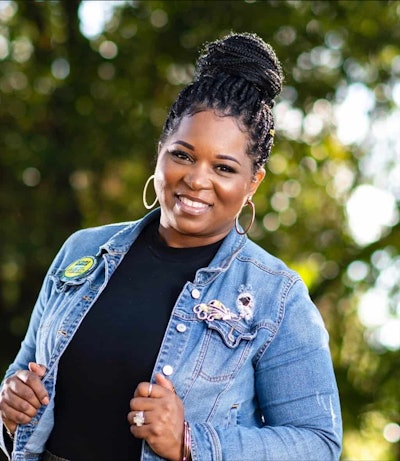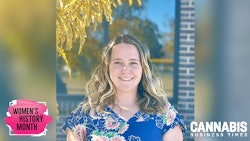
Larger cannabis companies possess the resources but often lack the local-level trust and connections needed to cultivate a culturally inclusive industry.
Minorities for Medical Marijuana (M4MM) works to create that bridge, founder and CEO Roz McCarthy says.
Through nine national programs, such as Cannabis Business Licensing Bootcamp, which offers education for minority, women, veteran and small business owners, M4MM equips its clients with information, referrals, mentors and other resources needed to navigate the cannabis industry.
M4MM, a nonprofit organization that launched in 2016 in Orlando, Fla., has 27 state chapters throughout the U.S.; international chapters in Toronto, the U.K. and Jamaica; and two chapters at historically Black colleges and universities.
While M4MM has fostered trust in Black, Hispanic, veteran and other communities through state-level volunteers, the organization’s next focus is to help build relationships, uniting its clients with cannabis organizations, businesses and entrepreneurs, McCarthy tells Cannabis Business Times.
Tony Lange: What is M4MM most proud of accomplishing as an organization in 2021?
Roz McCarthy: We started Project Clean Slate (PCS), which is our expungement and education program. Hawthorne Social Justice Fund came on as our program partner, and that was the first time we had an organization that granted us the resources needed to run a full-service program. The Hawthorne team said, “Roz, tell us what work you need to do, give us a budget.” It felt like we were being taken seriously and given the opportunity in a true grant process. We ended up facilitating PCS programs in 10 states last year where we either provided our expungement education or we did an expungement clinic.
We also do wraparound services after the expungement clinics where we’ll help provide access to housing and information for health care. There was one gentleman who didn’t know there were some different organizations in Las Vegas that helped with finding affordable housing. Sometimes people are too proud to say, “I need help,” for everyday basic living things. We don’t allow them to feel that way. We just say, “Hey, if you need this, here are some social services or support for you.”
That surely was one of the highlights for the year, just seeing how we could take a concept and really bring it to fruition.
TL: Are corporate partnerships a focus for M4MM in 2022?
RM: Yes. We have nine programs. Our goal is to find a program partner for each one. When it comes to community-based activism, advocacy at the community level, we have the trust of the community. They know our brand, they know who we are, they know our intentions are good. We have longevity. So, if an organization wants to do outreach and community work, partner with us, let us do it in your name or together, but let us drive that. A lot of times, an organization in the space says, “Hey, we want to go out and be this big community organizer, but we’ve never done it before. And people out here really don’t trust us.” Trust, especially in the Black community, has always been an issue when it comes to looking at things like access to health care and social justice policy reform. We believe that M4MM can be that bridge between community and industry.
TL: In addition to your 27 state chapters and three international chapters, can you tell me a little bit more about your chapters at historically Black colleges and universities?
RM: We have chapters at Florida A&M University (FAMU) and at Southern University, which is in Baton Rouge, La. We’re looking to add two additional university chapters this year as well.
We are very intentional about creating chapters of our organization on campus. And all that means is just really normalizing the conversation around cannabis, especially from a medical perspective, because there are a lot of young people over the age of 21 who have issues where medical cannabis could be helpful. And instead of looking at cannabis as, “Oh, you just want to get high or smoke weed,” let’s allow folks to have an open conversation with a group of people and say it’s OK to look at this from a medical perspective. It’s OK to say, “I smoke because I’m suffering from PTSD because I was in a drive-by when I was younger,” or whatever the case may be.
Sometimes people at HBCUs get left out in regard to having access to information about what’s going on in the industry, career opportunities, business development opportunities and the idea of normalizing the use of this plant from a medical perspective.
TL: With the recent launch of Black Buddha Cannabis, how do you plan to build out that brand to correlate with M4MM’s main principles?
RM: This brand was built on my own personal health issues and health journey from when I suffered a concussion and a traumatic brain injury from a car collision. Why this brand is so important is because it normalizes the conversation around cannabis through addressing some of the negative connotations and labels associated with cannabis use.
Buddha, as it stands for, means enlightenment. After my car accident, cannabis really saved my life. When I started M4MM [before the accident] I was someone who had just been advocating for folks who want to have access to this plant to have access. But after my accident, I was basically to a point where, if it were not for this plant, literally I couldn't hold a conversation. I was disoriented. I was dizzy. I was nauseated.
What I want to do with Black Buddha Cannabis is create products that are about enlightenment, about feeling better through a wellness lifestyle that also happens to be environmentally conscious—all while being social equity-driven.
When we look for partners in each state, we’re trying to identify either a social equity operator or a minority operator to help us bring the Black Buddha brand alive and onto the dispensary shelves in each of these respective states.
TL: So, the types of cultivators and processors you hope to work with to build out Black Buddha Cannabis are oriented toward the goals of M4MM?
RM: Exactly. Our goal has always been about creating opportunity for the small business, for the social equity business, for minority owned businesses. When you try to build a brand, there are a lot of things that have to come into play. While I’m focused on lining up my vision to work with minority and social equity operators, my vision is also to make sure that we have an operator who can give us quality, consistent products at every level.
So, in some states I've been able to identify that operator who would be social equity and minority owned, and in some states I haven't. But that's not to say that we are not social equity-driven. It just means that in some states we're going be able to do it in a really strong and visible way, and in some states we may not. But that is our priority, as well as being environmentally conscious.
TL: Can you tell me a little bit more about your vision of being environmentally conscious?
RM: We are looking at packaging that is sustainable in nature that’s leaving a negative carbon footprint on this earth. We’re looking at overconsumption of packaging. How can we reduce that? So, some of our packaging we've identified is 100% compostable as well as 100% biodegradable.
TL: Shifting back to M4MM, what mission unifies the M4MM chapters?
RM: Our focus is advocacy, outreach, education and public policy. Any one of our core areas of focus where there’s a policy conversation going on, M4MM wants to be a part of that conversation, and it doesn’t always have to be something on social equity. Policy issues such as access to care, workplace protection for employees who utilize medical cannabis, and veteran services are examples of issues we are also passionate about. M4MM is a policy-oriented organization, and our team has the ability to create some guidelines and some recommendations, pushed out by National Public Policy Director Eric Foster. We have codified language for our chapters to share with their state lawmakers. So, if you want to know what binds us together, it’s our advocacy—being able to be fearless and speaking up and speaking out about normalizing cannabis and cannabis use.
TL: How does M4MM’s “stronger together” hashtag reflect its diversity, equity and inclusion efforts?
RM: There is strength in numbers when effecting change on issues that are important to the organization. If you just hear it from me, that’s one thing. But when you hear about the importance from many people and it is the same messaging, there’s a common note of information and resources shared in each respective state we serve. Seeing us work together as a team reminds people that together we can do so much versus trying to do and push out things by ourselves. M4MM was built on the premise of working together, and that was the reason for creating the state chapters.
TL: What were some of M4MM’s biggest struggles or obstacles to overcome as far as making positive changes in the cannabis industry for the communities you serve?
RM: The biggest challenge the past couple years was from COVID and losing some of our ability to interact through face-to-face engagements.
And then we’re continuing to work toward acquiring the resources we need through corporate partnerships. And I had some corporations that burned me last year, to be honest with you, where we started out working together for expungement clinics or other programs, and they stole ideas from us and started doing things on their own.
I think all of it comes from a sincere place, but we don't have the resources. So, imagine the time and the energy that it takes for us to put these programs together, and then you have a large MSO who takes what you did and goes, “OK, we're going to do this ourselves.”
So, that’s why identifying good corporate partners is important to us, and also being able to find that sweet spot of working together. That's where I'm going to be more intentional in 2022 in regard to what we're asking for and what we're delivering.
Those are some of the challenges, just trying to marry the work we're doing and work really well with our partners, so that they're happy and that we are happy, and that we're delivering on the promise of the work that is so important to us.
TL: What’s your viewpoint on where diversity, equity and inclusion (DEI) efforts currently stand in the cannabis industry?
RM: Let’s think about a marathon. A marathon consists of 26 miles and our DEI impact in this industry is still at mile marker 1 whereas the industry as a whole is at mile marker 7 or 8. The possibilities of catching up seem futile when you think about it. We need to be realistic about ways we can progress and catch up with the industry. Black and brown operators are still struggling to gain traction and the No. 1 reason is access to capital. Trying to compete in a race where there are consistent barriers prohibiting progress is a recipe for failure. Thank goodness this industry is young and can create new pathways to success such as supplier diversity/vendor contracting. Creating fairness and parity should be our guiding light as we continue to grow and prosper.
Editor’s note: This interview has been edited for style, length and clarity


























